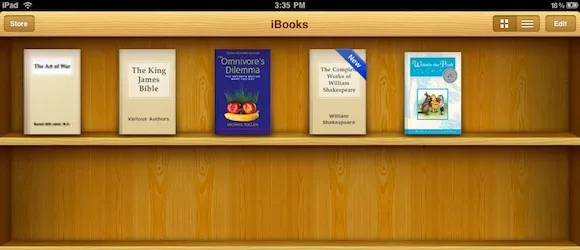And we were just talking about Amazon throwing its weight around to get small publishers to lower their ebook pricing even if they think it would be financially against their interests… now the US Department of Justice has warned Apple, Simon and Schuster, Hachette Book Group, the Penguin Group, Macmillan, and HarperCollins that it will be investigating them for possible violations of Anti-Trust Law in their pricing of eBooks.
The case rests on the rules Apple set down for how publishers would be required to publish their books to the iPad, and some significant differences between their rules and the way publishers interact with physical retailers.
The way regular book sales work is that publishers sell copies to retailers for about half of what they recommend the cover price to be. Then retailers like Barnes & Noble set their own prices as they see fit. When Amazon.com launched its eBooks platform, it priced new bestsellers at a fixed $9.99, worrying many publishers. Would consumers become too accustomed to cheaper eBooks and expect real books to follow the trend? Would physical retailers be unable to keep up with the price drops, leaving Amazon as the eight-hundred-pound gorilla who could dictate the prices of the entire book market? They’d already seen something similar happen to music when iTunes started selling nearly every song at $0.99.
So when Apple debuted it’s tablet/eTeader and iBooks, it took a different approach. From the Wall Street Journal:
As Apple prepared to introduce its first iPad, the late Steve Jobs, then its chief executive, suggested moving to an “agency model,” under which the publishers would set the price of the book and Apple would take a 30% cut. Apple also stipulated that publishers couldn’t let rival retailers sell the same book at a lower price.
“We told the publishers, ‘We’ll go to the agency model, where you set the price, and we get our 30%, and yes, the customer pays a little more, but that’s what you want anyway,'” Mr. Jobs was quoted as saying by his biographer, Walter Isaacson.
The publishers were then able to impose the same model across the industry, Mr. Jobs told Mr. Isaacson. “They went to Amazon and said, ‘You’re going to sign an agency contract or we’re not going to give you the books,’ ” Mr. Jobs said.
The Justice Department believes these large publishers and Apple acted “in concert” to raise prices across the industry. Barnes & Noble’s chief executive William Lynch, who has already been deposed, has denied that any joint action was taken, and maintained that agency pricing has allowed smaller eBook publishers to thrive, and that getting rid of it would put the pricing power for the whole industry in a single company’s hands. Before agency pricing “Amazon often sold best-selling digital books for less than it paid for them, a marketing stance that some publishers worried would make the emerging digital-books marketplace less appealing for other potential retailers.”
This argument has apparently not been persuasive to the DoJ, who want to know how increasing prices under the agency model could have resulted in more competition. The model still restricts publishers who work with Apple from pricing books lower than their price on iOS devices, even for eReader retailers who take less than a 30% cut. The investigation is ongoing, so we’ll have to wait and see if litigation actually occurs. The DoJ has investigated eBook practices before, in 2009, and the European Union is also investigating under the same claims.
(The Wall Street Journal, via Ars Technica.)








Published: Mar 8, 2012 4:54 PM UTC